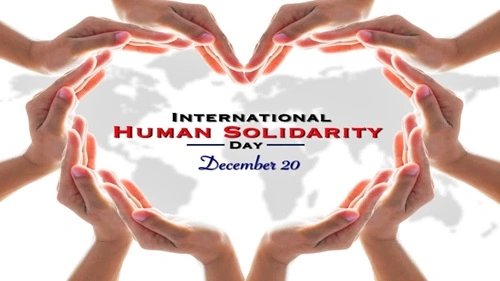International Human Solidarity Day, observed annually on December 20, is a United Nations-designated day to celebrate unity in diversity and promote the importance of solidarity in achieving global goals. This observance emphasizes the interconnectedness of humanity and encourages collective action to address social, economic, and environmental challenges.
The day underscores the role of solidarity in eradicating poverty, promoting sustainable development, and fostering a more inclusive and equitable world.
History and Origins

International Human Solidarity Day was established by the United Nations General Assembly (UNGA) in 2005, following the adoption of Resolution 60/209. The resolution recognized solidarity as a fundamental value essential for international relations in the 21st century.
The day aligns closely with the principles of the United Nations Millennium Declaration and the Sustainable Development Goals (SDGs), particularly in addressing global challenges like poverty, inequality, and climate change. It serves as a platform to remind the global community of the shared responsibility to build a better future for all.
The Meaning of Solidarity
Solidarity is a universal value rooted in mutual support, understanding, and cooperation. It represents:
- Unity in Diversity: Embracing differences while recognizing common humanity.
- Collective Responsibility: Working together to address challenges that affect everyone, especially the most vulnerable.
- Equity and Inclusion: Ensuring that no one is left behind in the pursuit of progress.
Significance of International Human Solidarity Day
This day highlights the critical role of solidarity in achieving global goals and addressing pressing issues:
- Eradicating Poverty: Solidarity ensures that resources and opportunities are shared equitably, helping to lift people out of poverty.
- Promoting Sustainable Development: Collaboration among nations, organizations, and individuals is essential for tackling climate change, preserving biodiversity, and fostering economic growth.
- Addressing Inequality: Solidarity helps bridge gaps between rich and poor, urban and rural, and developed and developing countries.
- Building Resilience: Collective action strengthens communities’ ability to recover from crises, such as natural disasters, pandemics, and conflicts.
Solidarity and the Sustainable Development Goals
The 2030 Agenda for Sustainable Development places solidarity at the core of its vision. Many of the 17 SDGs emphasize the importance of global cooperation and shared responsibility. Key goals linked to solidarity include:
- Goal 1: No Poverty – Combating poverty requires collective action and equitable distribution of resources.
- Goal 10: Reduced Inequalities – Solidarity ensures that marginalized groups have equal access to opportunities.
- Goal 13: Climate Action – Tackling climate change demands global unity to implement sustainable practices.
Themes of International Human Solidarity Day
While the day does not have a fixed annual theme, its overarching focus remains on fostering unity and addressing global challenges. Recent observances have emphasized themes like:
- Global Partnerships for Development: Highlighting the importance of collaboration across sectors.
- Social Inclusion: Ensuring that vulnerable groups, such as refugees, migrants, and people with disabilities, are not excluded.
- Climate Solidarity: Advocating for joint efforts to combat the climate crisis and support those most affected.
Global Challenges Requiring Solidarity
Solidarity is crucial in addressing several global challenges:
1. Climate Change
The effects of climate change, such as rising sea levels, extreme weather events, and habitat loss, require coordinated global action. Developed countries, which contribute most to greenhouse gas emissions, must support developing nations in transitioning to sustainable practices.
2. Health Crises
The COVID-19 pandemic demonstrated the importance of solidarity in public health. Fair distribution of vaccines, sharing medical resources, and supporting healthcare systems in low-income countries are critical for combating global health emergencies.
3. Inequality
Economic and social disparities are widening, with billions of people lacking access to basic needs like education, healthcare, and clean water. Solidarity ensures that everyone benefits from progress.
4. Conflict and Displacement
Wars, political instability, and human rights violations displace millions. Solidarity is vital for providing humanitarian aid and fostering peacebuilding efforts.
How International Human Solidarity Day is Observed
The day is marked by activities and events aimed at raising awareness and inspiring action:
- Community Engagement Local initiatives, such as food drives, volunteering, and educational campaigns, encourage individuals to practice solidarity in their communities.
- Policy Advocacy Governments and organizations use the day to advocate for policies that promote social inclusion, reduce poverty, and address global challenges.
- Educational Campaigns Schools and universities host workshops and discussions to educate students about the importance of solidarity and collective responsibility.
- Global Initiatives International bodies like the UN and NGOs launch campaigns and projects to address pressing issues, such as climate change and humanitarian crises.
- Media Outreach Social media campaigns, documentaries, and public service announcements amplify the message of solidarity, encouraging widespread participation.
How You Can Contribute to Solidarity
Individuals can play a vital role in promoting solidarity through simple actions:
- Support Local Causes: Volunteer your time or resources to community organizations that address social issues.
- Advocate for Change: Use your voice to support policies and initiatives that promote equity and inclusion.
- Promote Awareness: Share information about International Human Solidarity Day on social media to inspire others.
- Practice Empathy: Treat others with compassion and understanding, especially those from different backgrounds.
- Reduce Inequalities: Support businesses and organizations that prioritize fair trade, sustainable practices, and social responsibility.
Looking Ahead: Building a World of Solidarity
In an increasingly interconnected world, the importance of solidarity cannot be overstated. From addressing global crises to fostering peace and inclusion, solidarity is the foundation for creating a just and equitable future. As the international community strives to achieve the SDGs by 2030, solidarity remains a guiding principle in ensuring that progress benefits everyone, leaving no one behind.
Conclusion
International Human Solidarity Day is a powerful reminder of our shared humanity and collective responsibility. It calls on individuals, communities, and nations to work together in addressing global challenges and building a world where equity, inclusion, and sustainability prevail. By embracing the principles of solidarity, we can create a brighter, more resilient future for all. Let us use this day to reaffirm our commitment to unity in diversity and take meaningful steps toward a more compassionate and connected world.

